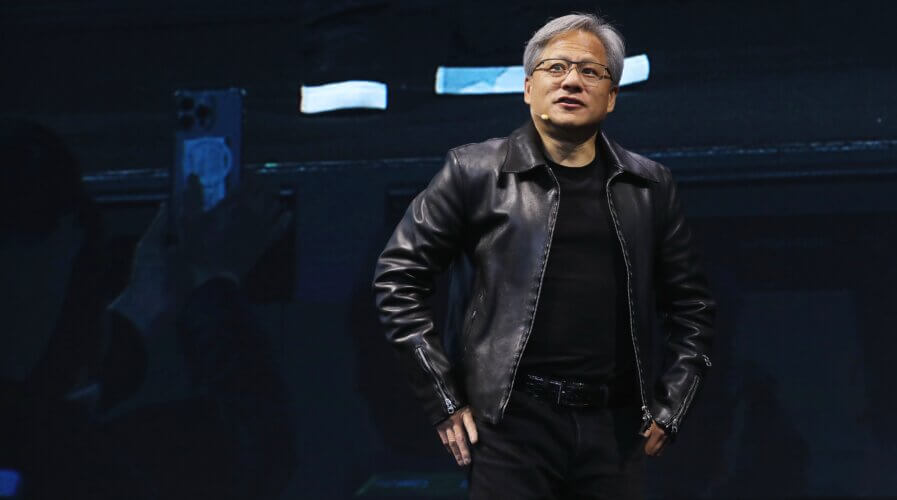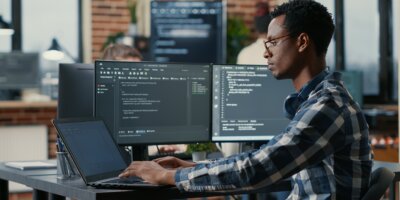
No more coding classes? Nvidia’s CEO believes AI is enough (Source – Shutterstock)
Nvidia’s CEO, Jensen Huang: AI will take over coding, making learning optional
- AI is set to make coding accessible for everyone, reshaping how we learn to program.
- Huang predicts a shift from traditional coding to using AI for software development.
- Despite AI’s rise in coding, the journey of learning and innovating in tech continues.
Nvidia’s CEO, Jensen Huang is stirring the pot again, folks. This time, he’s stepping up with a bold claim that’s set to redefine our understanding of coding. But he’s not just throwing this out into the void; he’s delivering his message to an audience with the power to broadcast it across the tech landscape.
Remember the good old days? Those were the times when wrestling with strings and arrays, spending hours diligently debugging, and trying to unravel complex algorithms were considered rites of passage for developers. Those challenging days are on the cusp of becoming historical footnotes, thanks to the revolutionary entrance of generative AI into the coding domain, signaling a transformative shift in the development process.
AI is no longer just a supporting act; it’s assuming the lead role, fundamentally altering the coding narrative. The advent of AI is moving us away from the precise details of programming languages, guiding us towards a broader horizon where problem-solving and innovation take precedence. The empowerment provided by AI is democratizing software development, enabling individuals with minimal tech exposure to create applications, a scenario that once seemed far-fetched.
The evolution from coding challenges to AI solutions
TechRadar has recently illuminated Huang’s dialogue at the World Government Summit in Dubai, where he made a compelling argument that in the wake of AI’s rapid advancements, we may need to reassess the elevated status traditionally accorded to coding skills within the tech realm.
For a long time, mastering coding was seen as the golden ticket in the tech industry. Huang is challenging this long-standing paradigm, suggesting it’s time for a strategic pivot in how we prioritize skills for the future.
Huang is shaking things up, proclaiming that the era of prioritizing coding skills is over. Now, he suggests, we should focus on fields like agriculture and education. The rise of generative AI and natural language processing technologies is set to revolutionize our approach to technology, potentially redirecting the countless hours previously dedicated to learning programming languages towards gaining a deeper understanding of these critical areas.
Huang is on a quest to render technology so user-friendly that programming becomes an innate skill for everyone, achievable through the simplicity of our native languages. He envisions a future where the magic of artificial intelligence makes everyone a programmer, without the need for specialized coding languages.
However, Huang quickly points out that this doesn’t spell the end for coding. A foundational understanding of coding principles remains essential, particularly for leveraging AI programming effectively. He’s advocating for a shift towards upskilling, ensuring that individuals grasp the ‘how’ and the ‘when’ of employing AI in problem-solving.
His enthusiasm for natural language processing suggests a future where the barrier to coding is not the complexity of programming languages but rather the ability to communicate ideas clearly. This could potentially open up programming to a much wider audience.
Personal reflections on the coding journey
Looking back on my journey into the world of coding during my university days as a network engineer, I was captivated by the magic of creating something from nothing. The simplicity and immediacy of building websites with HTML and CSS were exhilarating, offering a tangible sense of creation from mere lines of code.
Java, on the other hand, presented a steeper learning curve. Unlike the more intuitive HTML and CSS, Java introduced a level of complexity that tested my resolve, demanding a deeper understanding and a more significant commitment from those who wished to master it.
Yet, the challenge of Java was also its reward. It served as a gateway to a broader understanding of programming concepts such as object-oriented programming and multithreading, enriching my coding repertoire.

Java was a learning curve, but it comes with rewards. (Source – Shutterstock).
The journey through learning Java, and programming in general, taught me an important lesson: the path to mastery varies greatly depending on your objectives. For those looking to get their feet wet, the learning curve is manageable. But for those aiming for proficiency, the road is fraught with complex concepts that require dedication.
Then came C++, a language that, in its complexity, offered a profound depth of understanding for classes, structs, memory manipulation, and foundational programming concepts. The journey to mastering C++ was a testament to the value of persistence and the transformative power of applying theoretical knowledge to practical projects.
The future of programmers in the age of AI
The emergence of AI in coding brings us to a pivotal question: will AI render programmers obsolete? My perspective leans towards skepticism. Despite the undeniable impact of AI, the nuances of legacy code, the necessity of oversight, and the intricacies of control suggest that programming jobs will evolve rather than disappear. The prospect of AI enabling lay users to create software through conversation opens new possibilities, but also underscores the enduring value of programming expertise – because if you create in your natural language, you’re not inherently challenged to know what has gone wrong, or why, when it inevitably does, and so don’t have the understanding to correct it.
As we navigate the initial stages of AI’s integration into coding, it becomes apparent that we are interacting with the nascent stages of AI’s capabilities. These early iterations, while impressive, are placeholders for the more sophisticated, efficient solutions that are yet to emerge.
As we stand on the precipice of this new era that Huang envisions, where AI could fundamentally alter our relationship with coding, we’re reminded of the journey that has brought us here. The core of technology—learning, applying, and exploring—remains as dynamic and exciting as ever, even as we venture into this uncharted territory.
READ MORE
- 3 Steps to Successfully Automate Copilot for Microsoft 365 Implementation
- Trustworthy AI – the Promise of Enterprise-Friendly Generative Machine Learning with Dell and NVIDIA
- Strategies for Democratizing GenAI
- The criticality of endpoint management in cybersecurity and operations
- Ethical AI: The renewed importance of safeguarding data and customer privacy in Generative AI applications


